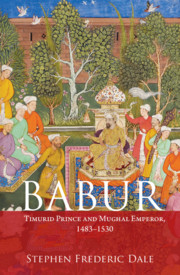Book contents
- Frontmatter
- Dedication
- Contents
- List of Illustrations and Maps
- Preface
- Abbreviations
- Introduction
- 1 Qazaq: A Timurid Vagabond
- 2 Padshahliq, Governance, in Kabul
- 3 Mulkgirliq: The Act of Kingdom-Seizing
- 4 Padshahliq, Governance, in Hindustan
- 5 Gurbatliq: An Indian Exile
- Conclusion
- Glossary
- Bibliography
- Index
- Plate section
Conclusion
Published online by Cambridge University Press: 13 September 2018
- Frontmatter
- Dedication
- Contents
- List of Illustrations and Maps
- Preface
- Abbreviations
- Introduction
- 1 Qazaq: A Timurid Vagabond
- 2 Padshahliq, Governance, in Kabul
- 3 Mulkgirliq: The Act of Kingdom-Seizing
- 4 Padshahliq, Governance, in Hindustan
- 5 Gurbatliq: An Indian Exile
- Conclusion
- Glossary
- Bibliography
- Index
- Plate section
Summary
In his history of the Mongol Khans, Haidar Mirza Dughlat Kürägän (d. 1551) included what amounted to an obituary of Babur, who, Haidar Mirza gratefully reports, treated him like a son after he took refuge with Babur in Kabul in 1509. Writing in Persian, he says of his older Timurid cousin:
He is a ruler adorned with accomplishments and praiseworthy characteristics. Of all his qualities, bravery and gallantry are dominant. In Turkish poetry, after Mir Ali Shir, no one has composed so much as he has. He also has a verse composition called Mubin on jurisprudence, and it is a very useful treatise and commended by all. He has written a tract on Turkish metrics, and before him no one has ever written on that topic so nicely. He versified His Holiness's [‘Ubaidullah Ahrar] treatise the Walidiyya. He has also written his ‘events’ as his history in Turkish is called. It is extremely smooth and flowing, and his pure style is chaste and easy to understand… In music and other things probably no one from his family was ever so accomplished as he. Amazing things and astonishing battles have happened to him, the likes of which have never happened to his peers.
Later in the century Abu'l Fazl ‘Allami (1551–1602), Akbar's chronicler, produced a more elaborate memorial to Babur. Using the florid style beloved of literate Persian-speaking intellectuals, such as Shaikh Zain Khwafi, the chronicler of the Battle of Kanwah, Abu'l Fazl, wrote:
It would be impossible even if volumes were employed to detail the perfections of this Holy One. Among them he possessed the eight essentials of empire, viz. (1) high fortune; (2) great designs; (3) conquering power; (4) administrative capacity; (5) civilizing faculty; (6) devotion to the welfare of God's servants; (7) the cherishing of the army; (8) the restraining it from evil.
And in acquired accomplishments, he was at the head of his Age. He held high rank as a poet and a prose writer, and especially in Turki poetry. The Turki dîwân (dîwân-i-turki) of his Majesty is of great eloquence and purity, and its contents are charming. His book of Masnawî which has the name Mubîn (clear) is a famous composition and is mentioned with great applause by critics.
- Type
- Chapter
- Information
- BaburTimurid Prince and Mughal Emperor, 1483-1530, pp. 209 - 220Publisher: Cambridge University PressPrint publication year: 2018

